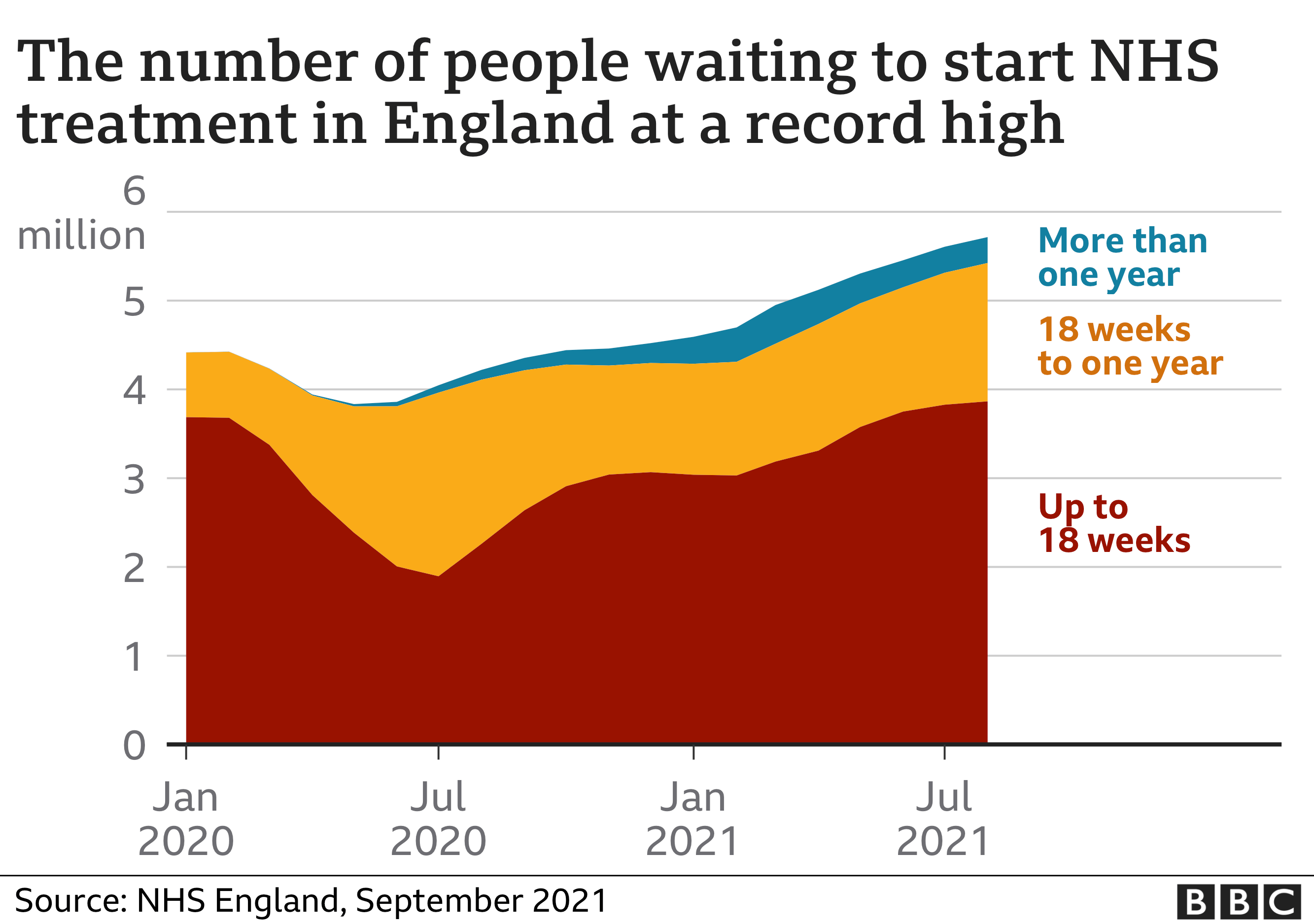Fix NHS staffing crisis to tackle waiting lists backlog, warn MPs
A long-term plan to fix the staffing crisis in the NHS is needed to cut record waiting lists for treatment, the government is being warned.
Currently, nearly six million people in England are waiting for routine operations and procedures – many of whom are in pain.
A report from MPs says the government needs to address staff shortages – or NHS workers will quit.
The government pointed to the extra £5.9bn allocated to tackle the issue.
There have been repeated warnings over the length of hospital waiting lists in England.
As of September 2021, a record 5.8 million patients were waiting for surgery – such as hip or knee replacements – with 300,000 waiting more than a year compared with just 1,600 before the pandemic.
In the autumn Budget, the government announced an extra £5.9bn for the NHS in England to help clear the backlog. This was on top of another funding package in September to create an extra nine million checks, scans and operations.
“We have over 5,100 doctors and nearly 10,000 more nurses in the NHS compared to last year and we’re committed to delivering 50,000 more nurses by the end of this Parliament.”
But in its report published on Thursday, the Commons health and social care select committee said the health service is hugely understaffed and is facing an “unquantifiable challenge” in tackling the backlog.
While it welcomed the government funding, the committee said NHS England has yet to publish “how it plans to meet its workforce requirements”, despite this being promised by Health Secretary Sajid Javid by the end of November 2021. It wants the government to draw up a recovery plan for services by April.
The report says many NHS staff are feeling under pressure and could quit unless they see the “light at the end of the tunnel” of more staff coming.
Jeremy Hunt – the former health security who now chairs the committee – said the NHS was short of 93,000 workers.
He describes the staffing crisis as “entirely predictable”, adding: “The current wave of Omicron is exacerbating the problem, but we already had a serious staffing crisis, with a burnt-out workforce, 93,000 NHS vacancies and no sign of any plan to address this.
“Far from tackling the backlog, the NHS will be able to deliver little more than day-to-day firefighting unless the government wakes up to the scale of the staffing crisis facing the NHS, and urgently develops a long-term plan to fix the issue.”
Think tank The Health Foundation estimates that nearly 19,000 more nurses and more than 4,000 more doctors are needed in order to get back to the 18-week standard waiting time for treatment.
- Why the NHS is struggling like never before
- Trusts cancel surgery as NHS Covid pressures mount
- Emergency patients urged to take lift to hospital
- ‘I went to Sri Lanka for my operation’
The MPs also want the government to publish an independent assessment of projected staff numbers every two years. It said it had previously recommended something similar – but it had been voted down by the government.
“Without such an independent forecast of future workforce needs, it remains impossible for anyone – including this committee – to know whether enough doctors, nurses or care staff are being trained,” the report said.
The committee said it was also concerned about the social care workforce, which has about 105,000 vacancies.
Doctors have welcomed the report for highlighting the staffing crisis, with the British Medical Association saying it “clearly lays out what a gargantuan challenge the NHS faces”.
“The biggest barrier to tackling the backlog caused by the pandemic is a severe staffing crisis and our calls for improved workforce planning have thankfully been heard. It’s now time for the government to listen too.”
The Royal College of Surgeons said the main issue right now was that more than one in 10 NHS staff members were at home ill or self-isolating.
“We must improve workforce planning, and fully support the committee’s call for objective and independently-audited annual reports and workforce projections.
“These should include an assessment of whether sufficient numbers of staff are being trained.”

And Minesh Patel, head of policy at Macmillan Cancer Support, said: “After years of failing to deliver the long-term funding and planning the NHS needs, the government must now urgently commit the resources required to support and grow the cancer workforce, so that it can tackle the backlog and provide urgent cancer care to everyone who needs it.”
The Department of Health and Social Care said in a statement that it was committed to supporting NHS staff.
“We have provided an additional £5.9bn to help tackle the backlogs and we are investing £36bn over three years which will help deliver an extra nine million checks, scans and operations for patients.
“We have over 5,100 doctors and nearly 10,000 more nurses in the NHS compared to last year and we’re committed to delivering 50,000 more nurses by the end of this Parliament.”
Many NHS trusts are currently struggling to cope amid the Omicron wave and staff shortages, and some hospitals have cancelled operations and declared critical incidents.


Comments are closed.